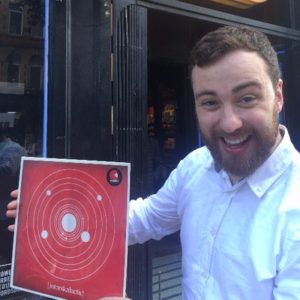The most important benefits of Arts Education exist in the areas of personal development and sense of identity.
– By Chris Rooney, Music Educator working for Dabbledoo Music

Chris Rooney invites primary school teachers to sign up their pupils for a free course in music at Dabbledoo.com
When I was 16, our school PE teacher took our class to the local swimming pool to try diving off the high board. There were 3 levels of height and each of us took it in turns to go from board to board, conquering our fears and leaping off.
Each time the board got higher and the number of participants became fewer and fewer. There was little guidance or comment from the teacher on how we should jump or enter the water; the focus was simply on encouraging us to do it.
Fast forward to today (I’m 28 years old and living in Sydney), a few friends and I travelled to a beach in the suburb of Manly. One of the group suggested we should go to a nearby diving spot to which we all agreed. Once we arrived and after some nervy looks over the edge, we threw ourselves off the cliff into the turquoise water below; the feeling was that familiar breathless rush from all those years ago.
DabbledooMusic is a new method to encourage teachers and students to explore music in a creative and fun way.
After the dive, I thought about this memory from my school days. What was our teacher’s reason for taking us to jump off a board? It wasn’t something we were being marked on, nor did we have a diving team. So why would he do it? It must have been because he knew what an impact overcoming our fears would have on us later in life.
There are generally three accepted areas that education aims to address: the impact on the individual, the impact on society, and the impact on economic factors.
In recent years, the focus in education has been centred on how it can serve economic needs. The promotion of the STEM subjects is directly related to the growing need for these skills in the job market. While I have no problem with this, I strongly feel it should not be at the expense of the other two objectives of education.
The question is, what can we do to feed these individual and societal needs? The answer, in my opinion, is arts education.
While most would accept the arts are a good thing for children to learn in school, my issue with a lot of commentary about arts education is that it is framed in how it benefits other subjects. Commentators point to details such as how the Mozart effect of listening to classical music makes you smarter or how studying the arts will make you better at reading, writing and maths.
All these may be true and, if they are, that’s great – I’m all for it. However, the problem with framing it in this way is that arts education starts to be seen in an ancillary manner where its reason for existing is to support these ostensibly “more important subjects”.
To my mind, it should be framed in a way that emphasises the important fact that the arts help build the identity of a person. They provide an outlet for a person to appreciate one’s culture, to develop passions and to form lasting friendships through a shared commonality. In other words, all the good stuff that one can’t typically put a number against.
Arts education in Ireland is currently undergoing a revival with the launch of the Creative Youth program at the end of 2017. The program has been initiated to ensure ‘every child in Ireland has practical access to tuition, experience and participation in music, drama, art and coding by 2022.’ The commentary from the government’s plan fits this approach of focusing on how the arts can develop creativity in the lives of young people and the cultural identity they represent.
This is an exciting new program which has made some promising claims for the provision of arts education. However, in a world where budgets are there to be held accountable, undoubtedly there will need to be tangible metrics from an initiative like this.
While this is a fair requirement, the program should focus firstly on the impact of engaging with the arts on an individual, and only thereafter on any potential economic gains.
By doing this and understanding the immeasurable benefits these subjects can have on an individual’s personal development, investment in the arts is seen as central to a child’s education and less of a dive into the unknown.
Visit www.dabbledoomusic.com to sign up to one of its free courses.